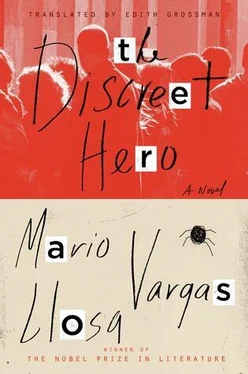“He didn’t look like a fag, Papa,” Fonchito reassured him. “I swear. I recognize queers on the prowl for boys right away because of how they look at me. Even before they open their mouths, honestly. And because they’re always trying to touch me. This man was just the opposite — very educated, very refined. He didn’t seem to have evil intentions, really.”
“They’re the worst kind, Fonchito,” Doña Lucrecia declared, frankly alarmed. “Hypocrites, who don’t seem to be but are.”
“Tell me, Papa,” Fonchito said, changing the subject. “What he told me about the archangel Luzbel, is it true?”
“Well, it’s what the Bible says.” Don Rigoberto vacillated. “It’s true for believers, at any rate. It’s incredible that at the Markham Academy they don’t have you read the Bible, at least for your general education. But let’s not get distracted. I’ll tell you again, son: It’s absolutely forbidden for you to accept anything from strangers. No invitations, no conversations, no nothing. You understand, don’t you? Or do you want me to forbid you to go out at all?”
“I’m too old for that now, Papa. Please, I’m fifteen.”
“Yes, as old as Methuselah.” Doña Lucrecia laughed. But Rigoberto immediately heard her sighing in the dark. “If we’d only known how far this would go. My God, what a nightmare. I think it’s gone on for a year.”
“A year or even a little more, love.”
Rigoberto forgot about the stranger who talked to Fonchito about Luzbel in the café in Barranco Park almost immediately. But he was reminded and became uneasy a week later when, according to his son, as he was coming back from playing soccer at San Agustín Academy, the same gentleman showed up again.
“I had just taken a shower in the San Agustín lockers and was going to meet up with Chato Pezzuolo so we could ride the jitney together to Barranco. And you won’t believe it but there he was, Papa. Him, the same man.”
“Hello, Luzbel.” The gentleman greeted him with the same affectionate smile. “Remember me?”
He was sitting in the hall that separated the soccer field from the exit door of San Agustín Academy. Behind him was the dense serpent of cars, trucks, and buses moving along Avenida Javier Prado. Some vehicles had their headlights on.
“Yes, yes, I remember,” said Fonchito, sitting up straight. And, in an unequivocal tone, he confronted him. “Excuse me, but my papa has forbidden me to talk to strangers.”
“Rigoberto is absolutely right,” the man said, nodding. He was wearing the same gray suit as last time, but the purple sweater was different, without the white diamond pattern. “Lima is filled with bad people. There are perverts and degenerates everywhere. And good-looking boys like you are their favorite targets.”
Don Rigoberto opened his eyes very wide.
“He mentioned me by name? Did he say he knew me?”
“Do you know my papa, señor?”
“And I knew Eloísa, your mama, too,” the gentleman replied, becoming very serious. “And I also know Lucrecia, your stepmother. I can’t say we’re friends, because we hardly see one another. But I like both of them very much; since the first time I saw them, they seemed a magnificent couple. I’m glad to know they take good care of you and look out for you. A boy as handsome as you is not at all safe in the Sodom and Gomorrah that Lima is.”
“Could you tell me what this Sodom and Gomorrah is, Papa?” Fonchito asked, and Rigoberto noticed a sly gleam in his eyes.
“Two ancient cities, very corrupt, and because they were, God destroyed them,” he replied cautiously. “It’s what believers believe, at least. You have to read the Bible a little, son. For your general education. At least the New Testament. The world we live in is filled with biblical references, and if you don’t understand them, you’ll live in total confusion and ignorance. For example, you won’t understand anything of classical art or ancient history. Are you sure he said he knew Lucrecia and me?”
“And my mama too,” Fonchito specified. “He even said her name: Eloísa. He said it in a way that made it impossible not to believe he was telling the truth, Papa.”
“Did he tell you his name?”
“Well, not that,” Fonchito said, disconcerted. “I didn’t ask him and I didn’t even give him time to tell me. Since you ordered me not even to say a word to him, I ran away. But I’m sure he knows you, knows both of you. If not, he wouldn’t have told me your name, he wouldn’t have known my mother’s name, or that my stepmother is named Lucrecia.”
“If by any chance you run into him again, be sure to ask what his name is,” said Rigoberto, scrutinizing the boy with suspicion. Could what he was telling them be true, or was it another of his inventions? “But don’t talk to him, let alone accept a Coca-Cola or anything else. I’m more and more convinced he’s one of those depraved people who wander loose through Lima looking for young boys. What else would he be doing at the San Agustín Academy?”
“Do you want me to tell you something, Rigoberto?” said Doña Lucrecia, pressing her body against his in the dark as if reading his mind. “Sometimes I think he’s making all of it up. Typical of Fonchito and his fantasies. He’s played that trick on us before, hasn’t he? And I tell myself there’s nothing to worry about, that this gentleman doesn’t exist and can’t exist, that Fonchito invented everything to make himself interesting and to make us uneasy and dependent on him. But the problem is that Fonchito is an expert trickster. Because when he tells us about their encounters, it seems impossible that what he’s saying isn’t true. He speaks so honestly, so innocently, so persuasively — well, I don’t know. Don’t you react the same way?”
“Of course I do, just like you,” Rigoberto confessed, embracing his wife, warming himself with her body and warming her. “A great trickster, of course. I only hope he’s invented this whole story, Lucrecia. I hope, I hope. At first I didn’t think too much about it, but now these appearances are beginning to obsess me. I start to read and the little brat distracts me, I listen to music and there he is, I look at my prints and what I see is his face, which isn’t a face but a question mark.”
“Honestly, with Fonchito at least you’re never bored,” said Doña Lucrecia, attempting to joke. “Let’s try to rest a little. I don’t want to spend another sleepless night.”
A few days went by and the boy didn’t mention the stranger to them again. Rigoberto began to think that Lucrecia was right. It had all been a fantasy of their son’s to make himself interesting and capture their attention. Until one cold, drizzly winter evening when Lucrecia greeted him with an expression that startled him.
“Why that face?” Rigoberto kissed her. “Because of my early retirement? You think it’s a bad idea? Are you terrified at the thought of seeing me here at home all day?”
“Fonchito.” Lucrecia pointed to the lower floor, where the boy’s bedroom was. “Something happened to him at school and he won’t tell me what. I realized it as soon as he came in. He was very pale, trembling. I thought he had a fever. I took his temperature, but no, he didn’t have one. He was withdrawn, frightened, he could barely speak. ‘No, no, I’m fine, Stepmother.’ He had almost no voice. Go see him, Rigoberto, he’s in his room. Let him tell you what happened. Maybe we ought to call Medical Alert. I don’t like the way he looks.”
“Damn it, again,” Rigoberto thought. He raced down the stairs to the lower floor of the apartment. In fact, it was the brat again. Fonchito resisted at first. “Why should I tell you if you don’t believe me, Papa?” But finally he gave in to his father’s loving words. “It’s better to get it off your chest and share it with me, my boy. It’ll do you good to tell me about it, you’ll see.” His son was pale and didn’t seem himself. He spoke as if the words were being dictated to him or he might burst into tears at any moment. Rigoberto didn’t interrupt him once; he listened without moving, totally absorbed in what he was hearing.
Читать дальше

![Гарри Гаррисон - Bill, the Galactic Hero [= The Starsloggers]](/books/87536/garri-garrison-bill-the-galactic-hero-the-star-thumb.webp)










